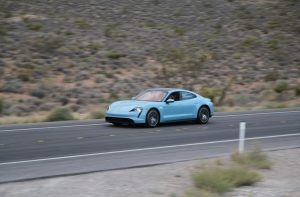
by Logan Harms
As the years inch closer and closer to 2035, there is a growing concern in the car community about the takeover of electric vehicles. With massive companies like Stellantis and General Motors going fully electric, many are starting to become educated about electric cars, and they’re starting to learn the truth: that electric cars aren’t that good for the environment.
Cars and trucks are responsible for around 24% of yearly greenhouse gas emissions in the U.S., and while it is true that electric cars do produce little to no greenhouse gases, Vinod Khosla (an economic venture-capitslist) said that, “electric cars are coal-powered cars. Their carbon emissions can be worse than gasoline-powered cars.” This is because the electricity that powers the electricity for electric cars is produced by fossil fuels and coal. When we burn fossil fuels, the thermal energy heats massive pans of water, that in turn creates steam that pushes a turbine. This turbine is what produces electricity and energy. Nationally, the U.S. derives 61% of its electricity from fossil fuels, and 21% from coal.
In a Morgan Stanley report from 2017, they found that, in the U.S. and Europe, fossil fuels are accountable for a majority of the electricity that is used for Tesla cars. In that same report they also found that, accounting for the greenhouse gasses produced by fossil fuels, Tesla is responsible for .21 more metric tons than the average internal combustion engine.
While it is true that fossil fuel emissions have been going down (from 65% in 2017 to 61% in 2022), its downward trend has been steadily weakening, mostly due to the lack of people willing to switch to cleaner sources of energy. In December of 2022, Germany will officially halt all nuclear power plants. Nuclear energy has, time and time again, proven itself to be “the safest energy technology ever designed.” However, there are still organizations, and even governments, that refuse to accept nuclear energy. Solar and wind are excellent forms of energy, but they can be inefficient and still have their downsides.
Even the batteries in electric cars are far from perfect. The batteries are made from lithium and cobalt, which has caused many concerns. There are ethical concerns about labor practices for mining cobalt, and there are environmental concerns regarding the extraction of lithium. Mining lithium in the past has led to an impact on water supplies and water usage. This problem isn’t only a EV related issue, these batteries are in phones and laptops too. On top of the environmental risks, EV batteries aren’t very efficient. They are temperature sensitive, some can take very long to recharge, and they are nearly impossible to recycle.
At the end of the day, electric cars, despite often being referred to as “green”, aren’t environmentally safe. They are powered by fossil fuels, they have dangerous batteries, and they’re also just not as powerful as a combustion engine. They have no noise, no personality, and they can’t keep up with combustion engines on the Nurburgring. They have way too much technology, and they are way too new. It’s impossible to know if they will still be functional by 2035. Until we can make them more sustainable, electric cars will be stuck in park.











